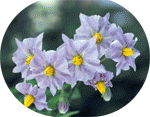| Abstract Detail
Conference Wide Mutschler, Martha [1], Lobato, Ricardo [2]. Combining Biochemical and Marker Analysis in Breeding for Acylsugar-Mediated Pest Resistance in Tomato. CONTROL of pests is an important factor in tomato production, but use of pesticides is increasingly limited by evolution of resistant insects, regulatory changes, and increasing health and environmental concerns. The resistance of Solanum pennellii is due to the production of the secondary metabolite acylsugars by glandular trichomes. The transfer of acylsugar production to cultivated tomato could provide an alternative method of pest control. The transfer of acylsugar-production to tomato used only a biochemical acylsugar assay as a selective screen through the fifth backcross. Acylsugar producing lines were created, however their plant type was very poor. Although progress in improving plant type was good in the early backcross generations, progress had slowed in the later generations. Genetic fingerprinting of the two BC5-derived acylsguar lines indicated that their genomes are 70 or 75% tomato, with the S. pennellii portion of their genomes contained in 8 or 9 introgressions, respectively. The genome of the 2000 acylsugar line differed from the 1997 acylsugar line only by the absence of one introgression, confirming that limited breeding progress was made in the fifth backcross generation using only the biochemical assay for selection. A set of SSR and CAP primers was assembled to screen segregating populations for introgression presence and/or reduction in length. These primers, and the biochemical assay, were used to characterize and select plants in BC6-derived populations. This combined approach was extremely successful in generating larger number of acylsugar lines that are fixed for the introgression contained and have shorter introgressions. More than 30 distinct acylsugar lines were generated in 2004 to 2005. These lines have genomes that are 85 to 90% tomato, with fewer and shorter introgressions, and with improvements in plant characteristics. The screening results also identified regions associated with defects in plant type, permitting further selection to eliminate these negative regions.
Log in to add this item to your schedule
1 - Cornell University, Department of Plant Breeding and Genetics, 303 Bradfield Hall, Ithaca, NY, 14853, U.S.
2 - Cornell University, Department of Plant Breeding and Genetics, 301 Bradfield Hall, Ithaca, NY, 14853, U.S.
Keywords:
Marker-Assisted Selection
Host plant resistance
Secondary metabolism.
Session: Poster-132
Location: Ballroom CD/Monona Terrace
Date: Tuesday, July 25th, 2006
Time: 8:00 AM
Abstract ID:297 |
